7Aunit4 my day task
7A Unit4 My day Main task

Useful expressions
I like / do not like….
My favourite subjects(s) is / are….
I can learn a lot about ….
It helps me….
It is fun/ interesting.
I cannot …, so ….
Talk about Millie’s favourite activities.
1. Does she like …? Why ?
2. Does she dislike …? Why ? 3. What is her favourite activity? Why?
According to Millie’s likes and dislikes to fill in the sentences: lie likes ______ because she can learn more about the world. 2.She likes ________ because it is fun. 3.She loves ________ because they are good for her and they help her get ready for the day. 4.She loves lessons because teachers are ____________ and the subjects are ________. 5.She dislikes basketball because she __________ and she can not play it ________. 6.She dislikes homework because she always has too _______.
新牛津7A unit4 myday task
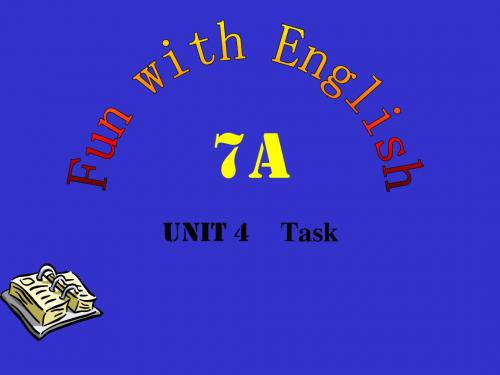
learn a lot about …… = know a lot about …… “了解更多关 于……(的情况),更多地了解……” 1. I want to learn a lot about your family.
2. He wants to learn a lot about our school.
7A
Unit 4 Task
Activities
I like_________. My friend likes_____________
I dislike______________. My friend dislikes___________.
morning exercises
They are good for us. They help us get ready for the day.
Activity Do morning exercises
Reason They are good for us.They help us get ready for the day.
Lessons
Basketball Reading Drawing Homework
Teachers are nice and the subjects are interesting.
I dislike_________because_________________.
Part A
Millie’s happiness chart
Love
Like
Dislike
Lessons Homework Reading Drawing Basketball Do morning exercises
Lessons
7A Unit4 My day 教案

7A Unit 4 My dayTeaching Contents:Comic strip and welcome to the unit Teaching aims1.Learn to talk about daily activities in English2.Learn the new wordsTeaching Difficulties:Introduce daily activities in EnglishTeaching Aids: CAI pitures recorderTeaching Methods:1. Communicative teaching method2. “Task-based” teaching methodTeaching procedures:Step 1. Lead-in1.What time do you usually get up?2.When do you go to school every day?Step 2. PresentationLearn some new words•wake up 醒来seldom adv. 很少need vt&n需要have fun 玩得高兴•activity 活动homewok 家庭作业usually adv. 通常start vt&vi开始•quarter n.四分之一past perp.经过never adv.从不be late for 迟到Step 3 Look and answerWhat is Eddie doing?Step 4 Listen and anwer1 .What is Hobo doing?2. What does Eddie do after breakfast?3. What does he do after lunch?4. What does he do after lunch?Step 5 Read and actFree Talk:Do you want to be a lazy student?Step 6 Ask and answer1.What do we often do at school?2.What do we do at home?do morning exercises have lessonsdo after-school activities get upeat breakfast/lunch/supper go to beddo homework watch TVStep 7 Look at Millie’s dailyStep 8 Let’s have a talk-- What time does Millie get up?-- She _____________________-- What does she do at 7.30 a.m.?-- She _____________________Step 9.Talk about your daily activities:1.Finish the form on page 43.2.Try to say something about your own daily activities like that:Hi, I’m _______. I’m _____ years old. I study at _______________. I __________. In the morning, I ____________________Step 10.Listen and answer1.When does Millie go to school every day?2..What time does Millie start lessons every day?Step 11.Read and actStep nguage pointsStep 13.Exercises:1.翻译下列词组2.用所给词的适当形式填空3.选词填空4.完成下列句子Homework1. Act the conversation in pairs after class.2. Preview the new words in Reading.Teaching Contents:ReadingTeaching aims:1. Identify specific information about school life and activities2. Practise reading skills by learning Millie’s article.3.Learn the new wordsTeaching Difficulties:dentify specific information about school life and activities Teaching Aids: CAI pitures recorderTeaching Methods:1. Communicative teaching method2. “Task-based” teaching methodTeaching procedures:Step 1 Lead-inA story about FrankStep 2. Discussion1.Do you like your school?2.What do you think of your school life?3.What do you often do at school?Step 3.Talk about your school life1. What do you think of your school?2. When does your school day start?3. Do you do morning exercises at school? When?4. When do you begin your lessons?5. What are your favourite lessons?6. What is your favourite sport?Step 4.Read and learn some new wordsin the morning/afternoon/evening 在上午/下午/晚上favourite adj.最喜爱的from…to… 从…到…first adv. 首先chat vi.聊天practise vt/vi练习have a good time 玩得高兴best a dj./ad v. 最好的wish n.祝愿Step 5.Read and answerWhich is Millie’s favourite subject?Step 6 Finish B1 and B2 then check answersStep 7 Read after the tape then finish more exercisesStep 8 Finish B3 and C then check answersStep 9 Phrases and language points in the articleStep 10TaskRetell Millie’s school lifeStep 11 Interview then give a short speechbe a student at, start , from…to…, do morning exercises, lessons begin, favourite subject, be good atfriends, be nice to, chat withlibrary, a Reading Club, read books, like playing volleyball , be in,have a good timeStep 12 HomeworkWrite about your school lifeTeaching Contents:GrammarTeaching Aims:.Learn the use of prepositions of time and adverbs of frequencyTeaching Difficulties:Learn the use of prepositions of time and adverbs of frequencyTeaching Aids: CAI pitures recorderTeaching Methods:1. Communicative teaching method2. “Task-based” teaching methodTeaching procedures:Step1 Lead-inIt is very cold in winterChildren’s Day is on June 1st.They do morning exercises a t 8 o’clockStep2 Present the use of preposition of timeWe use in before parts of the day、months 、seasons、years.We use on before days、dates 、special holidays、parts of a special day.We use at before time of day、age.Step3 Explan the use of preposition of timein 用于泛指一天的各个部分,月份,季节及年份on用于表示具体的某一天at用于表示具体钟表上的时间、年龄Step4 ExercisesFinish the exercises on page 47 then check answers.Fill in the blanks with in、on、atStep5 Present the adverb of frequencynever 、seldom 、sometimes 、often 、usually 、alwaysStep6 Look at the pictures and fill in the blanks.频率由高到低为always usually often sometimes seldom never Step7 Complete the exercises on page 48 then check answers.Step8 Work in pairs and talk about your diets.•What do you have for breakfast/ lunch/ dinner?•I always/ usually/ often/ sometimes/ seldom/ never have…for my breakfast/ lunch/ dinner.•Do you always/ usually/ often/ sometimes/ seldom/ never have… for…?•What about you?Step9 Finish more exercises一根据首字母及句意思补全单词二对画线部分提问三比较下列句子Step10 Homework1. Remember the new words in this lesson.2. Finish all the exercises about grammar.Teaching Contents:Integrated skillsTeaching aims1.Learn some phrases: a little busy ,Sports Center, come and watch the game , visit the museum, once a week, go on picnics.2. .Learn some sentences patterns:I hope everyone can come and watch the game. Wish our team good luck ! How often do you go on a picnic.3. Try to listen and finish the table.4. Try to talk about a volleyball match.Teaching difficulties:1.How to improve the students listening abilities.2. Try to talk about the weekendsTeaching aids: Tape,. Tape recorder. . Some pictures.Teaching Methods:1. Communicative teaching method2. “Task-based” teaching methodTeaching procedures:Step One presentationShow some pictures about sports activities in our school,What kind of activity is this? Which activity do you like best? How often do you practice it? You practice it once a week.Why do you like this kind of activity? You practice it everyday.I wish you the best.T: Do you have a football/basketball/volleyball/table tennis match in your school?Does your team often win? I wish your team good luck!Step Two Listeninglie is talking with Simon about a volleyball match .listen to their conversation.Tick the correct answer to each question.2.Listen to the dialogue and answer questions.(1) Where do they have the match?(2) How often do they have this kind of match?3.Make a survey.My school activities4.Make up your new dialogue according to the table above.A: . B:A: . B:A: . B:A: . B:Step Three Part A2Simon is making notes about the volleyball match .let us listen to the conversation again and help him complete the notes in part A2. Then check the answers.Step Four Part A3Simon wants to write a note about the volleyball match to his classmates .Would you please help him complete it?Finish it.Then check it .A Speak upsk students to read it.Step Five Speak up1.presentationT:Do you think the volleyball match is intresting ? :Do you have a volleyball match at school? Where do you often have the match? When do you often have the match ? At weekends or weekdays?T:What do you like to do at weekends? Have a match ,see a film or visit a museum? How often do you do that?2.Show “Speak up”T:Millie is chatting online with Tommy about their weekend.Please listen to their conversation and answer this questions :What does Tommy often do at weekend?Listen to the tapeStep Six PracticeListen to the tape again and again.Then read it many times unit reciting .Act it out.T:Would you like to introduce you weekend activities ? Pleasework in pairs and make new conversations.Sample conversations.S1:What do you like to do at the weekend ?S2:I like to see films with my parents.S1:How often you see a film .S2: About twice a month. What about you?S1: I like to watch TV.S2:Do you often watch TV.S1: Of course not .Sometime I play football with your friends.S2: That is great.Step Seven Homework1 记忆本课所学词汇,短语和句型。
[2021精选]七年级英语上册 Unit 4《My day》(task)
![[2021精选]七年级英语上册 Unit 4《My day》(task)](https://img.taocdn.com/s3/m/640982b4804d2b160a4ec009.png)
My day学生姓名___________ 家长签名_____________【学习目标】:1.表达对学校活动的喜爱程度。
2.说明喜欢或不喜欢某种活动的原因。
3.运用本单元所学知识写一篇文章,介绍自己对学校活动的喜欢程度。
【课前热身】:一、从课文中找出以下单词,词组1.不喜欢,厌恶 ______〔反义词〕_______2.原因,理由_______3.准备好,准备完毕________ ______________7. 对我们有益 be good for us8.帮助我们做好这一天的准备help us get ready for the day9.多多了解这个世界learn a lot about the world’s fun/interesting to do sth。
11.有太多的家庭作业have too much homework12.使用某物做某事use sth. to do sth 13. 不能打得好 can not play it well 二.看P52 A 笑脸图,答复以下问题:What activities does Millie love/like/dislike?____________________________________通过预习你还存在什么疑问?______________________________________________【学海拾贝】一.阅读P52 A表格内容,看看Millie love/like/dislike…,以及理由〔reason〕1.Why does she like morning exercises?_______________________________________2.Why does she love all her lessons?__________________________________________3.Why does she dislike basketball?___________________________________________4.Why does she love reading?_______________________________________________5.Why does she like drawing?_______________________________________________6. Why does she dislike homework?__________________________________________ 二.帮助Millie 完成Part B 日记〔diary〕三.再次仔细阅读Millie的日记,看看每段写了什么:Para 1:_________________________________________________________________Para 2:__________________________________________________________________Para 3:__________________________________________________________________★四:知识要点1. They are good for us.他们对我们有益。
202X牛津译林版英语7A Unit4 My day TASK课件

Please get ready for tomorrow's party. 聚会的一切准备就绪了。
Everything is ready for the party.
plete Millie’s diary entry on P53.
morning exercises
I like
I dislike
=I don’t like 不喜欢
reading watching TV
☺
eating apples
listening to music cooking
My happiness chart
☺ love
like
☺
dislike
Morning Reading Watching Eating
• I like (6)_m_o_r_n_in_g__e_x_e_rc_i_s_e_s. They are (7) _g_o_o_d__fo_r_u_s__. They help us (8)_g_e_t_r_e_ad_y__for the day. I also like (9)_d_ra_w__in_g_. It is (10)_f_u_n_.
and I go to bed late at night.
Homework
1.Recite part B . 2. Review the whole unit.
• 9、春去春又回,新桃换旧符。在那桃花盛开的地方,在这醉人芬芳的季节,愿你生活像春天一样阳光,心情像桃花一样美丽,日子像桃子一样甜蜜。 2021/3/122021/3/12Friday, March 12, 2021
牛津译林版7A Unit4 My day task课件(共17张PPT)
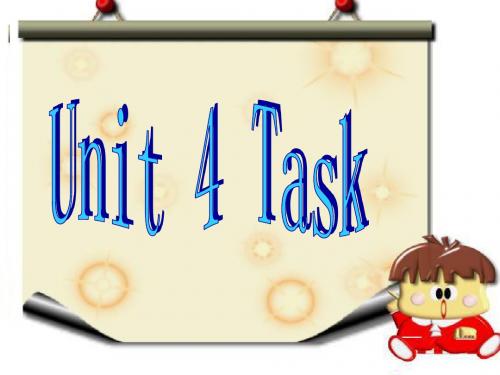
They are good for us. They help us get ready for the day. Teachers are nice and the subjects are interesting. I am not tall, so I cannot play it well. I can learn a lot about the world. It is fun. We always have too much homework!
Dicussion:
1. What do you uቤተ መጻሕፍቲ ባይዱually do at school? 2. What activity do you love? Why? What activity do you like? Why? What activity do you dislike? Why? e.g. I love/ like ... because... I really I love/ like ... because... I love/ like ... a lot/ very much because... I dislike ... because... I don't like... at all because...
教学目标:
本节课后,所有学生 1. 至少会使用1种方式表述自己“热爱”, “喜欢”和“不喜欢”某活动。 2. 至少写出5句话的一篇小文章。 3. 写作能有段落意识。
教学目标:
本节课后,所有学生 1. 至少会使用1种方式表述自己“热爱”, “喜欢”和“不喜欢”某活动。 2. 至少写出5句话的一篇小文章。 3. 写作能有段落意识。
Do you think I like running?
牛津译林版英语7AUnit4Myday知识归纳与拓展

7A Unit4 My day知识概括与拓展【词汇分析】1. wake upwake up 意为“醒来;叫醒”。
Jim often wakes up at seven in the morning .吉姆常常清晨7 点醒来。
Please wake me up at half past six.请在六点半叫醒我。
wake up 意为“醒来”时,后来不接宾语;意为“叫醒”时,后来可接宾语,但当宾语是人称代词时,一定放在 wake 和 up 的中间。
It ’s 7: 30 now . Let’s wake up your brother .此刻已经7: 30 了,我们把你弟弟叫醒吧。
Don’ t talk so loudly . You will wake them up .别那么高声地说话,你会把他们吵醒的。
2. needneed 用作及物动词,意为“需要”,后来可接名词或代词作宾语。
need to do sth.和 need sb./ sth. to do sth.是两个常用构造,意为“需要(某人或某物 )做某事”; need 也可作名词,意为“需要”,in need of意为“需要”。
We need some chicken and vegetables.我们需要一些鸡肉和蔬菜。
You need to have a good rest.你需要好好歇息一下。
I need you to help me .我需要你来帮我。
I am in need of some money .我需要一些钱。
3. restrest 既可用作名词也可用作动词,意为“歇息,歇息”。
She needs a rest after her long illness.久病以后她需要静养一段时间。
(名词 )An old woman is resting under a big tree .一位老太婆正在一棵大树下歇息。
(动词 )【常有搭配】have a rest=take a rest 歇息4. startstart 意为“开始,着手,出发” ,既可用作及物动词也可用作不及物动词。
七年级英语上册 Unit 4 My day Task教案 (新版)牛津版
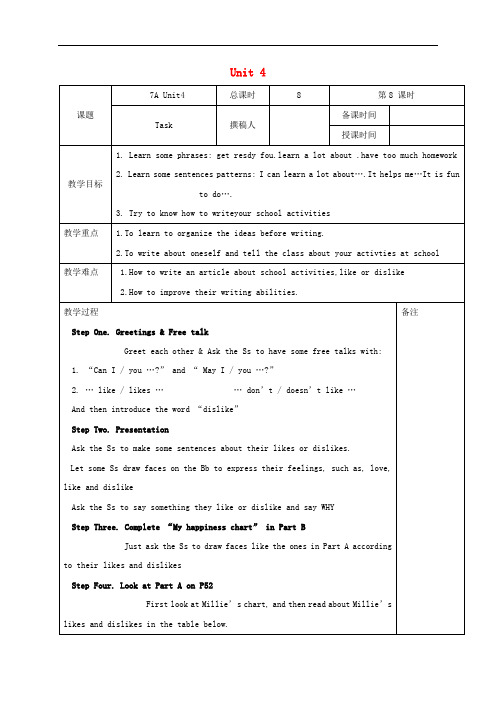
Just ask the Ss to draw faces like the ones in Part A according to their likes and dislikes
Step Four. Look at Part A on P52
1. happiness (n) happy (adj) happily (adv)
2. like like sb / sth / doing sth / to do sth
like sb to do sth
3. dislike like (opposite ) --- dislike dislike sb / sth / doing sth
2. Ask the Ss to work in pairs to discuss the reasons why they like or dislike certain activities.
3. Check the answers of some students and correct the mistakes
教学难点
1.How to write an article about school activities,like or dislike
2.How to improve their writing abilities.
教学过程
Step One. Greetings & Free talk
Greet each other & Ask the Ss to have some free talks with:
First look at Millie’s chart, and then read about Millie’s likes and dislikes in the table below.
牛津译林版7A Unit4 My day task课件(共20张PPT)
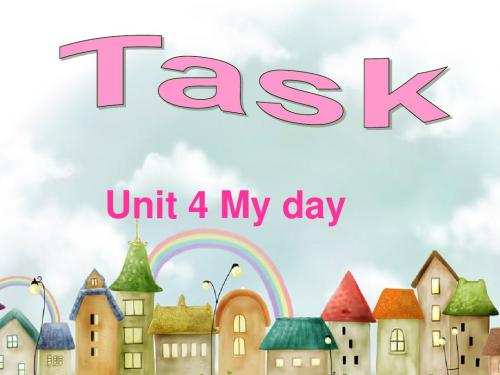
What activities does Millie love /like/dislike? She loves lessons and reading. She likes morning exercises and drawing. She dislikes basketball and homework.
4) I love reading because the books are … very interesting
5) I like drawing because the colours are … all very beautiful 6) I dislike homework because sometimes it is … too difficult
adj.准备好
为… 准备好
morning exercises
(like)
Do you like doing morning exercises ? Why……? 对…有好处 Doing morning exercises is good for us. They help us get ready for the day.
3. Why does she dislike basketball?
Because she is not tall. She cannot play it well
4. Why does she love reading? Because she can learn a lot about the world. 5. Why does she like drawing? Because it is fun 6. Why does she dislike homework?
牛津译林英语7aunit4Mydaytask课件.

目标定向:
1.学习并能默写以下单词和短语:dislike, reason, ready, learn, world, be good for, get ready for
2. 学习如何写一篇文章介绍自己喜欢与不喜欢某种运动 的原因。
3. 学会不完全以好恶来决定所做的事情,了解什么对自 己有益。
I like morning __________________. They are ___________. exercises good for us They help us ________ get ready for the day. I also like __________. It is fun ___. drawing I don’t like ___________. basketball I am not ___, tall so I cannot Millie’s dislikes Millie’s likes
(想了解许多关于这个国家的知识)
6. too much + 不可数n. too many + 可数n复数. much too + adj. / adv.
太多 太多 简直太
1)Watching ________ ____ too _____ much TV is bad for your eyes. 电视看的太多 2) There are _____ too ______ many cars in the park. 3) The picture is _____ much _______ too beautiful.
4. get ready for…… 为…做准备/准备好
be ready for…… 准备好…
最新牛津译林版七年级英语上册 Unit 4《My day Task》课件2

Please read the rest of Part A. Can you tell me the reasons of
her likes and dislikes.
• 4. Why does she love reading?
She loves reading because she can learn a lot about the world.
Please read the rest of Part A. Can you tell me the reasons of
have lessons I have some pictures here
what activity is
this in the
picture?
Do you like it ? Why do you like it? Why don’t you like it? Why do you dislike it?
I like/dislike
drawing
Homework! do homework I have some pictures here
what activity is
this in the
picture?
Do you like it ? Why do you like it? Why don’t you like it? Why do you dislike it?
I like/dislike
doing homework
Today, let’s talk about our school activities. I
want to know your likes and dislikes. Are
七年级英语上册 Unit 4 My day Task课件 (新版)牛津版

love
like dislike
learn a lot about the world
These days, I’m reading books about animals because I want _to__le_a_r_n__m_o_r_e_a_b_o__u_t different
animals _in__th_e__w_o_r_l_d_.
love
like dislike
I like/love … because It is interesting/useful/important ... I am interested in … I think it is important for us to learn … well. I like our… teacher. He/She is always… …
love
like dislike
reason 原因,理由
the reason for …
We have different reasons for our likes and dislikes.
love
like dislike
A: What subject do you like?
B: I like/love …
Unit 4 My day Task
Write about your day at school and your likes and dislikes.
love
like dislike
1. Daniel _d_i_sl_ik__es_ (like) basketball. He never plays it.
run fast
love
七年级英语上册《Unit 4 My Day》Task教案
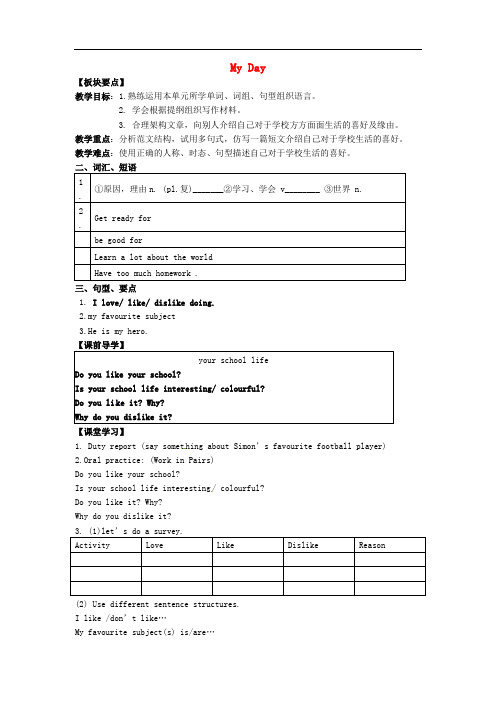
My Day【板块要点】教学目标:1.熟练运用本单元所学单词、词组、句型组织语言。
2. 学会根据提纲组织写作材料。
3. 合理架构文章,向别人介绍自己对于学校方方面面生活的喜好及缘由。
教学重点:分析范文结构,试用多句式,仿写一篇短文介绍自己对于学校生活的喜好。
教学难点:使用正确的人称、时态、句型描述自己对于学校生活的喜好。
二、词汇、短语1①原因,理由n. (pl.复)_______②学习、学会 v________ ③世界 n..2Get ready for.be good forLearn a lot about the worldHave too much homework .三、句型、要点1.I love/ like/ dislike doing.2.my favourite subject3.He is my hero.your school lifeDo you like your school?Is your school life interesting/ colourful?Do you li ke it? Why?Why do you dislike it?【课堂学习】1. Duty report (say somet hing about Simon’s favourite football player)2.Oral practice: (Work in Pairs)Do you like your school?Is your school life interesting/ colourful?Do you like it? Why?Why do you dislike it?Activity Love Like Dislike Reason(2) Use different sentence structures.I like /don’t like…My favourite subject(s) is/are…I can learn a lot about… It helps me…It is fun/interesting. I cannot…,so… We always have… (3) Writing:(选做)B 根据自己的happiness chart 写一篇文章。
七年级英语上册《Unit 4 My day Task》课件 (新版)牛津版

Fill in the blanks with in, on or at where necessary. in autumn. 1. Birds fly to the south _____ on 2. He got home _____ the morning of the 4th last month. at the weekend. 3. My father usually goes fishing ____ on a sunny morning. 4. It is a good idea to go for a walk ____
good for me.
speaking (speak) English • 8. Tom often practices__________
in the morning.
Don’t wake (not wake) him up. He is too tired. • 9.__________ watches • 10.Tom with his friends often ________(watch)
weekend.
seldom (很少) goes to buy books because he has 5. He _______
many at home.
first • 6. This is our_______(one) English lesson this term. exercises • 7. I love doing morning __________(exercise) .It’s
lessons at school. Our teachers are I love _______ nice interesting I love ______and the subjects are__________. reading From it, I can learn a lot _______too. the world about_________.
- 1、下载文档前请自行甄别文档内容的完整性,平台不提供额外的编辑、内容补充、找答案等附加服务。
- 2、"仅部分预览"的文档,不可在线预览部分如存在完整性等问题,可反馈申请退款(可完整预览的文档不适用该条件!)。
- 3、如文档侵犯您的权益,请联系客服反馈,我们会尽快为您处理(人工客服工作时间:9:00-18:30)。
英语(七年级上册)Unit 4 My dayTaskI. Teaching aims and learning objectivesBy the end of the lesson, students should be able to:1. understand the meaning of the happiness chart;2. complete Millie’s diary with the information about her likes and dislikes in the table;3. write about their own likes and dislikes.II. Teaching contents1. New words and expressions: dislike, reason, ready, get ready for sth., learn, world2. New structure: They help us get ready for the day.I can learn a lot about the world.III. Focus of the lesson and predicted area of difficultyDiscuss the students’ own likes and dislikes and write them down.IV. Teaching proceduresStep 1 Preparation1. Present “love”, “like” and “dislike”.T: Hello, boys and girls. Today we are going to learn about Task of Unit 4My day. In this period, you need to learn to write about your day at school and your likes and dislikes.(1) Explanation.Tell students that smiling faces stand for likes and crying faces stand for dislikes. Ask the students about their likes and dislike. Help students give reasons of their likes and dislikes.T: When we talk about our likes and dislikes, we can also use these three pictures. We usethe laughing face for “love”. We use the smiling face for “like”. And we use the cryingface for “dislike”. (Teacher presents “love”, “like” and “dislike”.)T: “Love”means “like something very much”or “the thing you like very much”. So,what does “dislike” mean?T: Yes, you’re so clever. “dis-” means “not”. So “dislike” means “don’t like something”or “the thing you don’t like”.(2) Exercise.T: Can you complete the two sentences?a. Daniel ____________ (like) basketball. He never plays it.b. Aren’t you happy with the plan? Tell me what your ____________ (like) are.T: Good! In the first sentence, “dislike” is a verb. It means “doesn’t like”. In the secondsentence, “dislike” is a noun. It means “the things you don’t like”.2. Talk about the preparations before class.(1) Explanation.T: Now, let’s talk about our days at school and our likes and dislikes. We do a lot of things at school every day. For example, before the first class begins in the morning, we do the morning reading and then morning exercises. Do you like them?S: I like morning reading.T: Oh, that’s good. Can you tell me why?S: Because it can help me remember things well.T: Yes, I agree. Reading aloud can help us a lot. What about morning exercises?S: I don’t like them.T: Oh, really? You dislike morning exercises. But why? I think they are good for us. They can help us get ready for the day. (Teacher presents “get ready for”.) Oh, it’s a new expression. Let’s read it together.(2) Exercise.T: Now, please complete the sentence.They are all ____________ the test.3. Talk about different subjects at school.(1) Make a dialogue.T: Every day, we have different lessons. What subject do you like or dislike? And why?(Teacher presents the pictures of various subjects) Different people have different ideas.We have different reasons for our likes and dislikes. (Teacher presents “reason”, “the reason for …”and “We have different reasons for our likes and dislikes.”) Now, boys and girls, please talk in pairs about the subjects you like and dislike in this way.A: What subject do you like?B: I like/love …A: Why do you like it?B: Because I think …A: What subject do you dislike?B: I don’t like…A: Why don’t you like it?B: Because … What about you?A: I like … because… And I dislike… becau se …(2) Sum up.T: Very good. All of you did a good job. I find some good sentences in your conversations.Let me show you some of them. These useful expressions may help you in your writing later.a. I like/love … because…b. It is interesting/useful/important/ …c. I am interested in …d. I think it is important for us to learn … well.e. I like our … teacher. He/She is always…f. I don’t like… because…g. It is too difficult for me.h. I am not good at …i. There is always too much homework.T: I think every subject is very useful. We should try our best to learn them well. Do you agree?4. Talk about after-school activities.T: After all the lessons finish in the afternoon, we always do different activities, such asbasketball, badminton, volleyball, drawing, singing, dancing, reading and many other interesting activities. What are your likes and dislikes?T: Please group yourselves into our teams. Tell your team members about activities you like and dislike. You can say it in this way.(1) I like … because…(2) I always/usually/often …(3) I don’t like… because…(4) I never/seldom …T: Yes, everybody has his own interest and hobbies. As for me, I dislike basketball because I’m not tall enough. And I like reading best because I can learn a lot about the world from books.(Teacher presents “learn a lot about the world”)T: Here, we have two new words. Let’s read them. Can you use the new expression to complete the sentence?These days, I’m reading b ooks about animals because I want ____ different animals ______. T: Now, let me show you some useful expressions for talking about after-school activities that we like and dislike. These useful expressions may help you.run fastjump highhave a sweet voicelearn a lot about the worldhelp me grow tall/strong/…I always enjoy myself when I …【设计意图:先引导学生谈论对课外活动的喜恶,然后教师在讲述自己的喜恶时需自然引出本课时的新词汇,最后展示刚才谈论中涉及或未涉及到的一些有用的词句,帮助学生为写作环节组织语言、积累素材。
